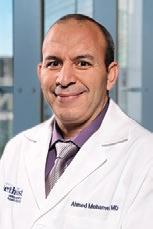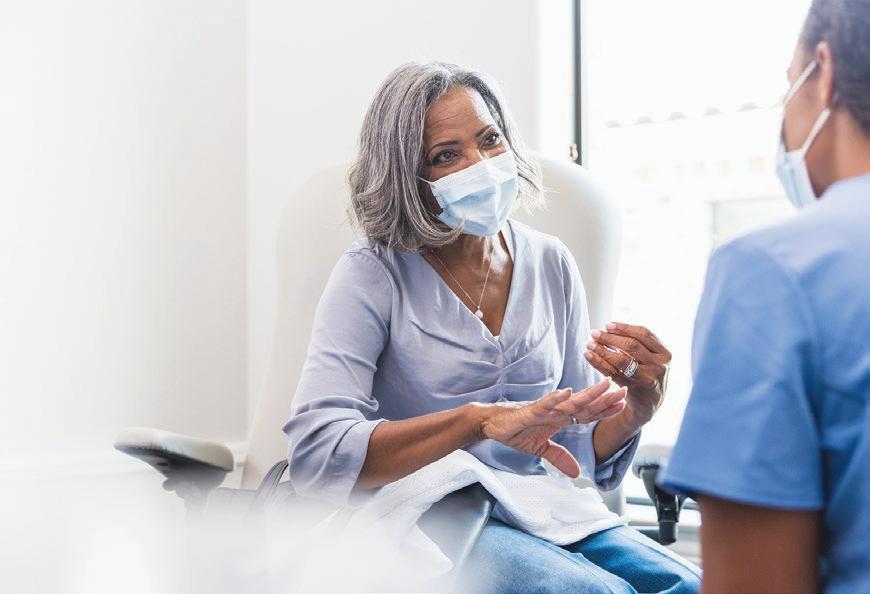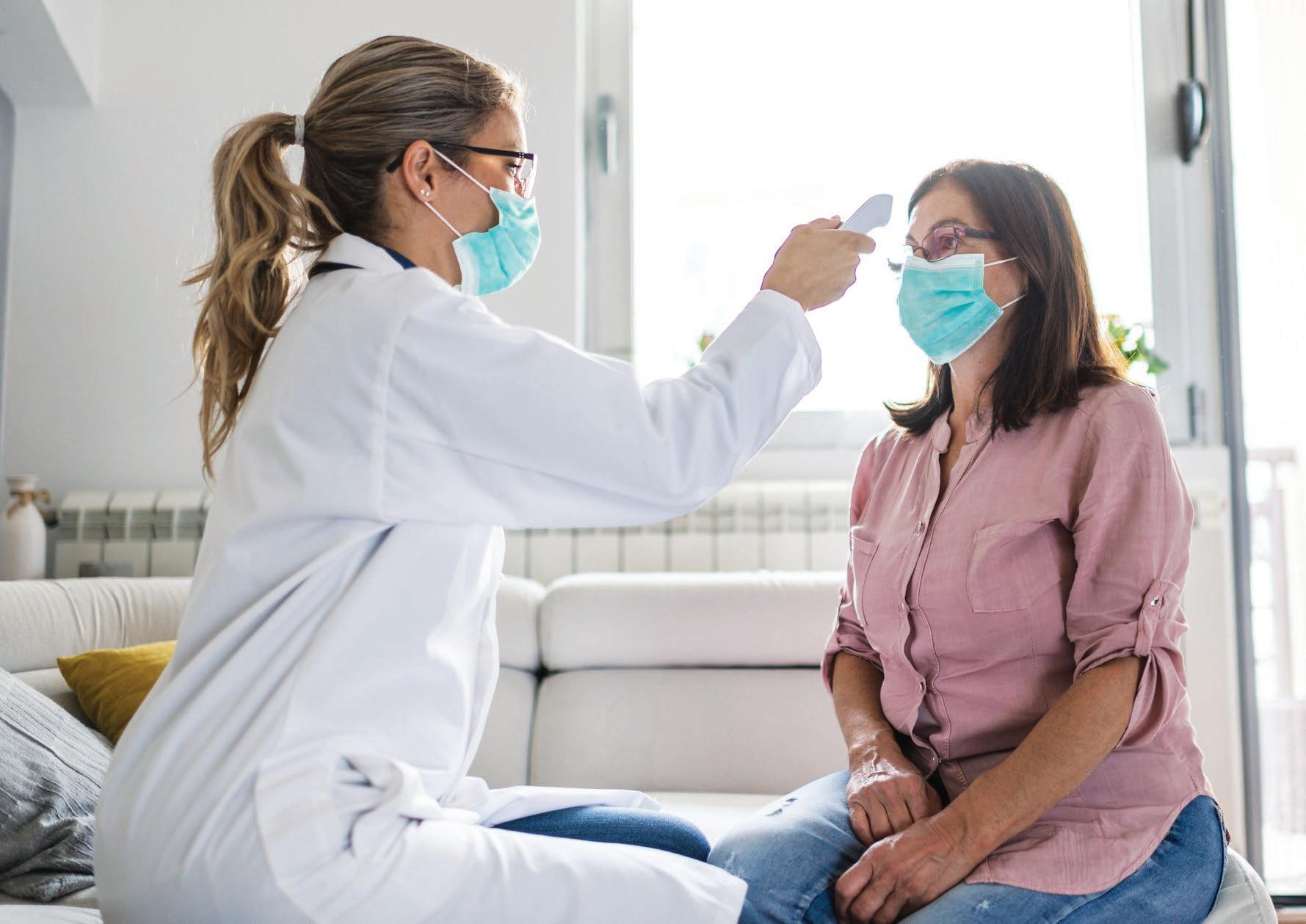LEADING MEDICINE




Varicose veins can be unsightly and may cause discomfort or pain. In some cases, they can even lead to serious health problems. Understanding more about them can help you decide how to deal with them.
Dr. Ahmed Mohamed, a cardiovascular surgeon with Houston Methodist Cardiovascular Surgery Associates, answers some common questions about varicose veins.

Q: What are varicose veins?
A: They are enlarged veins that may be blue, red or flesh-colored and occur most often in the legs. They may appear twisted and bulging and may be raised above the surface of the skin.
Q: What causes them?
A: Varicose veins may be caused by weak, damaged, deformed or missing valves in the veins. Your leg muscles push blood back to the heart against gravity. Normally, valves in your veins keep your blood flowing back to your heart. But if the valves aren’t working properly, blood can leak back into the veins and pool there, which makes the veins bigger; they can become twisted and bulging on the skin surface.
Q: How common are they?
A: Varicose veins affect half of people 50 years and older. They run in families and are more common in women and among older people, people who are overweight or obese, and those who sit or stand for long periods.
Q: When should I see a health care provider about varicose veins?
A: You should seek treatment if:
Varicose veins cause pain or aching.
Your legs swell or become heavy and you get tired, especially toward the end of the day.
A vein is red, swollen, very tender or warm to the touch. You have sores or skin breaking down on the leg or near the ankle.
The skin on your calf and ankle becomes thick and changes color.
A varicose vein begins to bleed. Your symptoms interfere with your daily activities. The appearance of the varicose veins distresses you.
There are many options for treatment; your doctor can work with you to decide what’s best in your situation.
Lifestyle changes — Get regular exercise; maintain a healthy weight; and elevate your feet so your legs are above the level of your heart when sitting.
Compression therapy — Over-the-counter or prescription-strength compression stockings or bandages squeeze your legs, helping blood move more efficiently. A proper fit is vital.
Sclerotherapy — A doctor injects a solution into varicose veins to close them.
Endovenous ablation — Lasers or radiofrequency energy are used to close off the affected veins.
Surgery to seal or remove large varicose veins can also be used, but it’s usually reserved for people who are not good candidates for endovenous ablation or sclerotherapy.
You don’t have to live with the discomfort of varicose veins. To learn more about your options, call 832.522.8600 to schedule an appointment at Houston Methodist Cardiovascular Surgery Associates.

Rheumatologists are specialists who treat autoimmune and inflammatory diseases affecting the joints, muscles, tendons, bones and connective tissues. An autoimmune disease is a condition in which your immune system mistakenly attacks your body. Your doctor may refer you to see a rheumatologist if you’ve been diagnosed with arthritis or if there is a concern for an autoimmune disease.
Rheumatic diseases are complex autoimmune and inflammatory diseases that can occur when the immune system malfunctions and attacks joints and other tissues in the body. “There are more than 100 types of rheumatic and autoimmune diseases that rheumatologists treat, but the most common are rheumatoid arthritis, psoriatic arthritis, lupus and gout,” said Dr. Syed Alam, rheumatologist at Houston Methodist West Hospital.
A rheumatologist may ask about your health history, do a physical exam, take X-rays, order blood tests or take samples of joint fluid to understand what may be causing your symptoms. Arthritis and other rheumatic diseases can be difficult to diagnose and treat, so it’s important to listen to your body and talk about your symptoms with a doctor. It is possible that your primary care physician may do certain rheumatological labs based on your symptoms, and if they are positive, you may be referred to see a rheumatologist. If you experience the following symptoms, it may be time to see your doctor or a rheumatologist:

1 Joint pain. Everyone experiences soreness and painful joints from time to time, especially after exercise or long periods of standing or walking. However, joint pain and stiffness that limit your mobility is not a normal part of aging. “When joint pain is chronic, and your primary care physician can’t help you manage it, you should see a rheumatologist,” Alam said.
2 Swelling of joints. If you are experiencing painful swelling in your joints, you should talk to your doctor or a rheumatologist about your symptoms. “Inflammation in your joints presents as swelling and may be a sign of rheumatoid arthritis, gout or another condition,” Alam said.
3 Bone health. People can have reduced bone strength with aging, and this can predispose them to getting
fractures. If you have weak bones on a bone scan or if you have had low-intensity fractures, your primary care physician may refer you to a rheumatologist to help improve bone strength.
4 Unexplained symptoms.
Rheumatic diseases can cause a range of symptoms that can be elusive and difficult to manage. You may experience rashes, joint pains, stiffness, swollen fingers and toes, dry eyes and mouth, and other problems. “A rheumatologist understands the complexity of rheumatic disease and is trained to help find solutions to help you feel better,” Alam added.
A rheumatologist has specialized training in rheumatic diseases affecting the joints, tendons, ligaments, bones and muscles, such as:
Rheumatoid arthritis
Psoriatic arthritis
Lupus
Osteoporosis
Vasculitis
Gout
Myositis
Sjogren syndrome
Polymyalgia rheumatica
Scleroderma

 Dr. Saiyada Mirza
Dr. Saiyada Mirza
Managing your health should always be a top priority, even when there’s a lot going on in life. This is especially true during a pandemic when it’s important to do what you can to stay healthy and safe. Focusing on preventive care can help you be prepared, and protect yourself and others.
Dr. Saiyada Mirza, internist at Houston Methodist West Hospital, says the goal of preventive care is to provide guidance for optimal health and well-being. “Closely managing your health can help you live a longer and more functional life,” she said.
You may be reluctant to go in for a checkup when you’re feeling fine
healthwise. But, being proactive about your health can prevent bigger, more expensive health problems down the road — and it can even save your life.
Essential tip: Managing your health is easier when you build a relationship with a primary care provider who knows you and your health history.
Did you know: Virtual visits allow you to see your doctor from the comfort of home via phone or computer.
Your doctor may recommend a cholesterol test, blood pressure screening, blood glucose test, mammogram, colonoscopy, prostate screening or other health tests. These tests can identify potential health problems so they can be prevented, treated or managed.
Essential tip: Ask your doctor about recommended screening tests for you based on your age, health history and other factors.
Did you know: Screening tests increase the chances of detecting certain cancers early, which provides more treatment options because they can be addressed sooner.
Vaccines provide protection for you and others against infectious diseases, such as flu, measles and pneumonia, which can be particularly dangerous for older adults and those with underlying health conditions. “It’s more important than ever to get your flu vaccine and stay up to date on other vaccines,” Mirza added.
Essential tip: Contact your primary care office to schedule flu shots and other vaccines for yourself and your family.
Did you know: It’s not too late to get a flu shot if you haven’t already. Although it’s best to get your flu shot as soon as it’s available in the fall, getting a flu shot later still provides protection for the rest of flu season into April and May.
Staying on top of your health during these challenging times starts with having a quality primary care doctor. Here’s what to consider when determining the best one for you: Board certification. Is the doctor board certified? This means he or she has proven expertise and can provide the highest quality care possible.
COVID-19 safety measures. Does the primary care doctor’s office have safety measures in place, such as enforcing social distancing and implementing disinfectant protocols for the staff?
Convenience and accessibility. How accessible is the doctor? Access to virtual visits, text-toschedule, online scheduling and
multiple locations across the Greater Houston area make a difference when you see your doctor on a regular basis.
Our physicians are safely seeing patients in-person and virtually with safety measures in place to protect patients from COVID-19.
Stay connected with your health by subscribing to our e-newsletter. Visit houstonmethodist.org/blog-stay-connected to sign up to receive the Houston Methodist On Health e-newsletter.
Following your doctor’s instructions for taking medications is an essential step in managing diabetes, heart disease, asthma and other conditions. Unfortunately, up to one-half of all prescribed medications are not taken as prescribed, according to a study in the American Journal of Accountable Care. “There are risks involved when you don’t take your medications as directed or misuse prescription medications,” Mirza said.
Essential tip: Have an honest conversation with your doctor or pharmacist to address any questions or concerns about your medications.
Did you know: Talk to your doctor if you’re having side effects or other concerns about your medications, including costs. Your doctor may decide to make adjustments to the dosing or prescribe a different medication that works better for you.
Millions of people are affected by mental health issues, including anxiety, depression and mood disorders. Talking about what’s going on and getting help with therapy or medications can help you start feeling better.
Essential tip: Your primary care doctor can assist with mental health concerns, including screening for depression.
Did you know: In a poll by the American Psychiatric Association, 68% of Americans reported feeling anxious about the possibility of family or loved ones getting COVID-19. If you feel overwhelmed or unable to function, talk to your doctor.
If you need some motivation and support for making changes, such as losing weight or quitting smoking, talk to your primary care provider first. He or she can provide guidance to help you get started and support with tools or medications to help you be successful.
Essential tip: Your chances of success go up when you have medical support for quitting smoking or losing weight. Did you know: If you’re overweight or obese, losing 5% of your body weight can have some big benefits for your health, including lower cholesterol, lower
blood pressure, reduced inflammation, reduced cancer risk and improved diabetes management.
You may be inclined to “wait it out” and delay getting medical care when something is wrong. However, it’s important to seek medical care when you have concerns about your health. When in doubt, get it checked out.
Essential tip: Don’t hesitate to call 911 for emergency medical help. For nonurgent health issues, make an appointment with your primary care doctor and write down some questions and notes about your symptoms.
Did you know: Worrying about the costs of health care shouldn’t be a barrier to your health. Detecting a health issue early can help avoid bigger problems later on, saving you money and improving your life in the long run.
 Dr. Doha Ayish
Dr. Doha Ayish
Suffering from an occasional headache can be bad enough. But if you battle chronic tension headaches or migraines, those that are frequent or continuous — you may be aching for two solutions: pain relief and prevention options.
“Certain physical or environmental factors, such as stress, hormonal changes, foods, smells and weather can trigger headaches,” said Dr. Doha Ayish, a neurologist at Houston Methodist West Hospital. “Knowing and avoiding triggers that affect you may help you to avoid the onset of a headache or migraine.”
Tension headaches are the most common type of headache, and they often occur when the muscles in the neck and scalp become tense. These headaches may cause a dull, aching or band-like pain in the forehead, temples or back of the head.
Episodic tension headaches are usually the result of temporary stress, such as one night of poor sleep or a bad day at work. Overthe-counter medications and relaxing or removing yourself from the source of stress can provide relief.
A chronic tension headache continues to be present almost daily. It may be related to anxiety, depression, a head injury or limited movement of the head, such as using a computer or microscope for long periods of time.
Other common tension headache triggers include:
Alcohol use
Caffeine — too much or withdrawal
Changes in sleep patterns
Colds and flu
Dental conditions, such as teeth grinding
Eyestrain — this may be caused by excessive screen time
Fatigue
Sleeping with the neck in an abnormal position
Smoking
“Right now, as more people are working from home, they may be spending increased time on screens,” said Ayish, “Make sure to take breaks and focus on something further away to give your eyes some relief.”
Migraines are severe headaches, and attacks can last from four to 72 hours or longer. The pain often begins on one side of the head and can be throbbing, pounding or pulsating. Pain can also occur in the face, sinus, jaw or neck area. Vision and neurological disturbances, called auras, happen for about 20% of migraine sufferers before a migraine attack. Sensitivity to light and noise is common.
Attacks may be triggered by:
Bright lights or sun glare
Certain foods, such as beer, red wine, aged cheeses, chocolate and caffeine
Changes in the sleep-wake cycle, such as insomnia or jet lag
Changes in weather or barometric pressure
Excessive noise
Hormonal changes, such as fluctuations in estrogen in women
Intense physical exertion
Medications, such as some high blood pressure medication or oral contraceptives
Missed meals

Smells, such as perfume, paint thinner or secondhand smoke
Stress
“Migraines are so debilitating, it is really crucial for those who live with them to learn and understand their triggers, and develop strategies to avoid them,” remarked Ayish. Some medications can be helpful in stopping attacks or preventing migraines. Alternative therapies, such as biofeedback, can help migraine sufferers control the physical responses to stress without drugs.
Headache triggers are different for everyone that’s why it’s important to focus on what affects you. Keeping a headache diary is a smart and easy way to recognize patterns. Use your journal to discuss your headaches with your doctor and determine prevention and relief tactics that are best for you. Call 832.522.8520 to schedule an appointment with a neurologist.
 Dr. Steven DelBello
Dr. Steven DelBello
Participation in all kinds of sports helps you reap the positive, lifelong benefits of exercise. But with the healthy fun of sports comes the risk of injuries. Before your family heads for the courts, ball fields or bike trails, prepare for safe sporting.
“People of all ages can help reduce their risk of injury by doing light conditioning first,” said Dr. Steven DelBello, an orthopedic surgeon at Houston Methodist West Hospital. “Spend some time getting fit with flexibility training, aerobic activity and strength training. Then try turning that conditioning into family fun. For example, do jumping jacks together, have relay races or go for a brisk walk.”
Always wear the proper equipment and protective gear for the sports you play. Safety gear may include helmets, eye protection, athletic supporters, shin or wrist guards — and don’t forget sunscreen when outdoors. It’s also important to wear supportive shoes for your activities.
Ease into sports by warming up and cooling down. Choose soft playing surfaces when possible to avoid the stress of running and jumping on asphalt and concrete. “Follow good form when playing sports — proper form in swinging, running, jumping and kicking can reduce injuries,” DelBello shared. “Teach young athletes to follow the rules of the game, and don’t allow them to continue playing when overly tired or in pain.”
Another key factor to safe sporting is staying hydrated. Make sure water is available and take breaks to cool off. Heat

Here is a look at some of the more common sports injuries. A sprain is a stretch or tear of a ligament, usually to the ankle, knee or wrist. A strain is a twist, pull or tear of a muscle or tendon. Some knee injuries include runner’s knee (pain or tenderness close to or under the kneecap), ACL (anterior cruciate ligament) tear and tendinitis.
A fracture is a break in the bone that can occur from a quick, one-time injury (acute fracture) or from repeated stress over time (stress fracture). Stress fractures usually happen in sports that involve the repetitive impact of running or jumping. A dislocation is a joint (usually shoulder or finger) that is separated. This is usually caused by contact sports and high-impact sports.
exhaustion and heat stroke are dangerous, when untreated. Watch for symptoms such as nausea, dizziness, weakness and confusion. Stop playing, cool off with ice or cold liquids and seek emergency medical attention if someone shows signs of heat-related illness.
When injuries occur, it is important to determine the severity of the injury and seek medical treatment if necessary. Many sports injuries can be treated at home with rest, ice, compression and elevation (RICE):
Rest or stop using the injured area for 48 hours.
Ice the injured area for 20 minutes at a time, four to eight times a day with a cold pack or ice bag wrapped in a towel.
Compress the injured area with bandages, an elastic wrap or air cast to reduce swelling. Ask a health care professional which is best for you. Elevate the injured area above the level of the heart to reduce swelling and pressure.
“But there are times when it’s important to see a doctor for urgent medical care so you can avoid further damage and ensure you heal properly,” DelBello said.
If










For
everything
from
annual checkups
to managing
chronic conditions,
taking care of your health should always be a priority.
Houston Methodist primary care doctors are still available to provide personalized care for you and your family — safely. We offer a variety of convenient ways to get care from us, from same-day sick visits to extended hours at select locations. And, you can be confident that we are taking every necessary precaution to keep you safe during your visit, including:
Screening all patients and seeing COVID-19 patients virtually only — allowing us to treat everyone safely
Wearing masks while providing care
Enhanced cleaning of equipment and surfaces
Ensuring social distancing in waiting rooms
Offering video visits with your doctor
Adding evening and Saturday hours to space out appointments